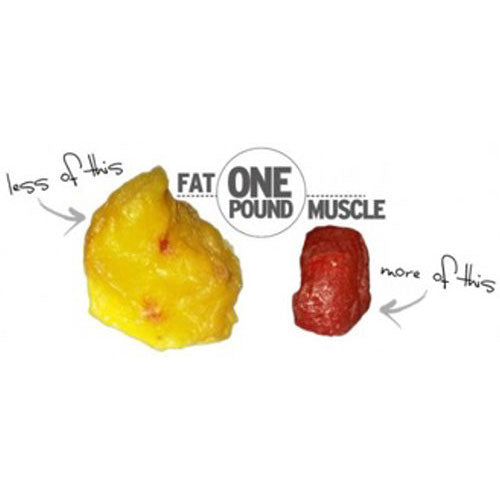
What Weighs More: Muscle or Fat?
Share

Pound of Muscle vs Pound of Fat
So, what’s one pound of muscle vs fat? A pound of fat is roughly the size of a small grapefruit; whereas one pound of muscle is about the size of a tangerine. In terms of appearance in our bodies, one pound of muscle takes up less space under our skin than the same amount of fat. Multiply the size difference by ten pounds or more, and we see a dramatic effect on our physical appearance.
Why The Scale Is Wrong
As we've stated before, the scale is a terrible device for gauging how healthy or fit a person is. As we see in the above comparison, a 140lb woman who is mostly muscle will be much smaller in terms of physical size than a 140lb woman who has a large amount of fat due to the density of pound of fat vs. muscle. We advocate putting the scale away and simply focusing on building muscle and lowering body fat through strength training and exercise.
Fat Doesn't Become Muscle
You can't convert muscle to fat. They are two entirely different substances that cannot be changed from one to the other. This small distinction is important to keep in mind as you continue toward your physical goals. As you burn more calories than you consume, your body will begin to use the energy reserves stored as fat in your body and you will begin to break down the fat tissue. Burning calories by strength training has an additional benefit in that it builds muscle, which further increases your body's daily calorie consumption.
Muscle Burns More Calories Than Fat
The muscle in a resting state burns roughly 10 calories per day. Fat only burns around 2-3 calories per day. There is a substantial difference between 1 pound of muscle vs 1 pound of fat that can be multiplied by adding pounds of muscle, helping to build up a surplus of calories burned throughout the day even at rest.
Protein Helps Build Muscle
The amino acids contained in protein are required to build new muscle, repair it, and maintain existing muscle. Many active women do not get enough protein from their normal food consumption. Women looking to build new muscle should aim for around .8 grams of protein per pound of body weight (150lb woman = 120 grams per day). Supplementing your diet with a protein powder supplement like Pin Up Girl Protein Powder is a great way to make up for the protein deficit in your diet.

